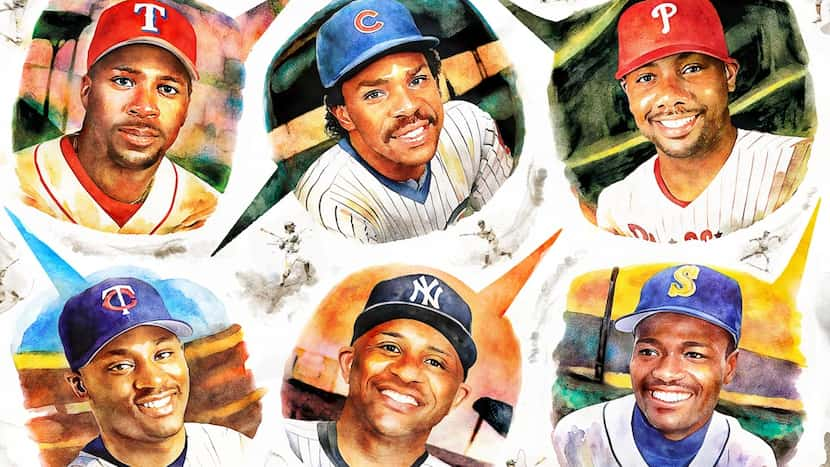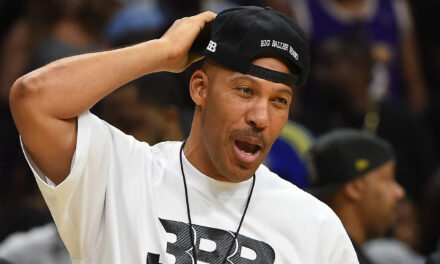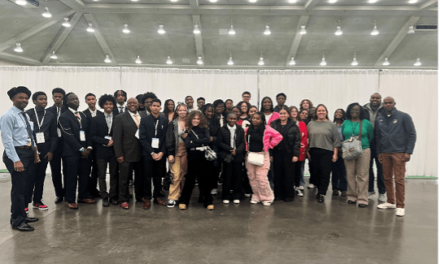
Baseball has long tread on its past where Black participation is concerned. Jackie Robinson changed American society when he integrated MLB. Some 50 years later, MLB consecrated it by retiring his number across the game, launching Jackie Robinson Day.
This year alone, MLB announced that Negro League stats had been fully merged into the official baseball record book and returned to Birmingham, Ala.’s Rickwood Field to play a regular-season game in tribute to the Negro Leagues.
But after decades of dwindling participation by Black Americans in the sport, MLB is also trying to make a more concerted effort in the future. There were only 57 Black players on MLB Opening Day rosters this season. Investments in youth academies, such as the Rangers’ in West Dallas, and other programs under the MLB Develops umbrella aim to change the direction. Among those programs, the Swingman Classic, an HBCU All-Star Game that will take place Friday at Globe Life Field to kick off All-Star Week.
Related:2024 MLB All-Star Game central: Texas Rangers set to host baseball’s best in Arlington
Rangers
Be the smartest Rangers fan. Get the latest news.
Ahead of the classic, The Dallas Morning News gathered six former longtime players whose playing experience ranged across five decades, including Hall of Famer Andre Dawson, Players Alliance co-founder CC Sabathia and former Ranger Mark McLemore, to discuss the state of Black participation in MLB.
What follows are excerpts from a fascinating one-hour conversation, the entirety of which can be viewed in the video below.
Having trouble getting the video to load? Disable your ad blocker.
Watch: Legends of the game break down issues facing Black MLB baseball players
Six former baseball players joined Rangers insider Evan Grant for a roundtable discussion about issues Black players have faced and still face in MLB today.
On the significance of the Swingman Classic
 Chicago Cubs’ Andre Dawson.(Michael Hogue)
Chicago Cubs’ Andre Dawson.(Michael Hogue)
Andre Dawson, 1987 MVP, National Baseball Hall of Fame inductee in 2010 and Florida A&M alumnus: “The inception of the HBCU All-Star Game has given these student-athletes an opportunity to showcase their talents and to be given a critical look. It’s a life-changing moment for them. There are going to be scouts watching. It’s the opportunity of a lifetime, but you want them to go out and enjoy it for what it is. It’s been a long time coming, but it obviously gives these individuals a look that will hopefully be given an opportunity to get to the next level.
Mark McLemore, former Rangers infielder and Swingman Classic coach: “It gives these kids an opportunity to expose their talent and show the world: ‘We’re still here.’
“For a lot of years, they’ve been overlooked, plain and simple. So coming up with the Swingman Classic, with the Andre Dawson Classic, it exposes these kids to an awful lot. They’ve just been overlooked for way too long. Not everybody is going to be able to go to Texas or USC or Arizona State. That doesn’t mean the talent isn’t there. Obviously, it is.”
Ryan Howard, 2005 NL Rookie of the Year and 2006 NL MVP with Philadelphia: “Ask my man Rickie Weeks [a 15-year starter in the majors]. Rickie went to Southern. Now, I’m sure people looked at him. And they were like, ‘Oh, man, you went to an HBCU, you’re not gonna make it.’
“Well, there’s something that you have to have, regardless of what school you go to. You’ve got to have heart. So giving these kids the platform to be able to showcase not just their ability, but also be able to showcase their heart. Man, you can’t ask for anything more.”
Harold Reynolds, MLB Network Host, two-time All-Star and three-time Gold Glove winner: “The reason this is important is we are up against a different animal than Rickie Weeks was up against. These [scouts] are data-driven. So, if you go to these other schools that don’t have the data, you don’t get seen. It’s just plain and simple. We have the draft coming up and we’ll have 50 players from the SEC. You can’t tell me they are the only players in the country. But everywhere they go, they’ve got a number attached to them and the teams go, ‘oh, I can I can relate to this.’
“Well, there’s gonna be a kid, a couple of kids in this game here, that if they were chartered every day of their college career, they wouldn’t be sitting around waiting for a 20th round.”
Related:Cowboys greats Drew Pearson, Cliff Harris explore role of sports in bridging racial divide
On the significance of revisiting history by integrating Negro League stats into MLB’s official stats and returning to Birmingham’s Rickwood Field for a Major League League:
 Minnesota Twins’ LaTroy Hawkins.(Michael Hogue)
Minnesota Twins’ LaTroy Hawkins.(Michael Hogue)
LaTroy Hawkins, Former Minnesota Twins pitcher, current Twins front office executive and Prosper resident: “I don’t think we’ve forgotten any history. Some people just don’t know the history period. They just don’t know it. When we get into integrating the Negro League stats into the Major League Baseball and get on that subject, a lot of people just don’t understand. Playing in the Negro Leagues wasn’t something they did to themselves. It’s where we were as a society.”
Howard: “[Integrating the stats] is massive, just massive. I forget who made this comment, but people were trying to say: ‘Well, Josh Gibson didn’t play against the best competition.’ Well, neither did Babe Ruth. You simply didn’t have all the best competition on the field playing against one another day in and day out.”
CC Sabathia, 2007 AL Cy Young Award winner, Vice Board Chair of Player Alliance: “I think what you hear is: Keep exposing people to Black baseball, whether it’s passing on the history of the Negro Leagues or more current like the HBCU classics or going back to Rickwood. It was just important for me, for this generation to be able to tell the story of the men that came before us, and to let people know that these guys were stars of their time. It’s just something that is bigger than just me or my career. It’s something I feel like I need to pay forward every single time I get a chance to explain it. I want to keep telling it.”
On going to Rickwood and the passing of former Willie Mays, who grew up in Birmingham, on the eve of the game there:
 New York Yankees’ C.C. Sabathia.(Michael Hogue)
New York Yankees’ C.C. Sabathia.(Michael Hogue)
Sabathia: “I just knew it was going to be a special moment. We didn’t know how sick Willie was. We didn’t understand that he was going to pass away while we were there. I was actually sitting in the Willie Mays Pavillion when I got the news that he passed away. And I was like, ‘Man, this is, sad. And it’s gonna kind of ruin the moment.’
“And then I was sitting there thinking: He kind of brought us all down here. Why else would we all be in Birmingham at one time, at that moment. We were going to celebrate his life and his career and it turned into a celebration of life. It just all made sense that we were all sitting there at that moment.
“I had been down there three or four times before the game, and every time, whether the stadium is packed or whether it’s empty, you feel the men who played before. You look down the right field line; you see where the Black fans had to sit. You feel it.”
Hawkins: “I wasn’t going and CC talked me into going because he told me it was gonna be something I didn’t want to miss. I made it and it was absolutely amazing. We had a great time. Just walking into Rickwood, you can feel all the men who look like us, who paved the way for us to be able to play the game. You can feel their presence.”
On Reggie Jackson’s poignant comments about how difficult it was for him to return to Birmingham, after encountering violent racism in the 1960s
 Philadelphia Phillies’ Ryan Howard.(Michael Hogue)
Philadelphia Phillies’ Ryan Howard.(Michael Hogue)
Howard: “My parents were both born and raised in Birmingham. So they were in the belly of the beast with the civil rights movement and everything that was taking place down there. So, it was totally understandable hearing what he said and I have those conversations with people all the time. I think for a lot of people, if it doesn’t affect your daily life, you’re not thinking about it. You hear it, but don’t know what it feels like. So, those stories, hearing what those guys were able to accomplish in the face of the racism that was taking place in the country was unbelievable.
McLemore: “Reggie’s monologue was great. I think it surprised everybody. It caught everybody off guard because I think it was initially going to be, you know, this Kumbaya moment. But Reggie brought some life to the things that Willie went through, that [Dawson] I know you went through. It was just mind-boggling to hear Reggie go through it step-by-step. I played with him early in my career. I got that education. It brought back a lot to hear those things again. Even I had forgotten about some of them. But Reggie brought them all back. And people need to know about them.”
Hawkins: “I left the Rickwood Game early because I had an early flight. The first thing I saw the next morning was Reggie’s comments. And it gave me goosebumps. You know why? He’s 78 years old. He’s not that old, fellas.
“For Reggie to open up and be that transparent, you could just hear it in his voice and it gave you empathy. It needed to be said. Because Mac is right, not all is Kumbaya to this day.”
Sabathia: “I was proud of him. I spent a lot of time around Reg. He’s told me that story so many times. He’s deeply hurt by the things that happened to him in the minor leagues in Alabama. And he’s still telling me, it’s still in there. You can see it when he was on set.
“Five minutes after that, I’m standing with him down on the field. And he’s going back through the story again, with me and [Derek] Jeter right there. I was just happy that he was able to get that off his chest and that everybody was able to react to it and him. It’s crazy to think that 10 years later, he’s in Yankee Stadium, hitting three homers in the World Series game and now he’s the biggest star in the game. What he had to walk through to be able to turn into Mr. October, it’s crazy. And he just wants people to understand.”
Dawson: “If the right topic or questions are asked, you are going to get an education from Reggie. He knows what he’s talking about. He’s not just Reggie the ballplayer; he’s a man. And with that comes a lot of knowledge.”
On the current lack of Black players in the majors leagues
Sabathia: “Some of the stuff that we have started, we have to continue to keep doing between Major League Baseball and some of the organizations outside of MLB. Just continue the mission. Dom Smith has an organization called Baseball Generations that does a lot of work. There is an organization called Minority Baseball Prospects that does a lot of work and they do an HBCU game, too. I’m the Vice Chair of the Players Alliance, founded by Cameron Maybin, and Dee Gordon and Edwin Jackson in 2020. MLB has the Breakthrough Series and the Hank Aaron Series, just trying to identify kids.
“The game is changing, with the field opening back up with rules changes. I think it’s going to change how we have to draft, too. So if we’re going to have to draft athletes again, the pool is going to open up because we’re not just going to be looking for big, power hitting guys. We’re going to need speed. Hopefully, the game is going to look like it did in the 80s. And, if so, if the rosters have to reflect the more athletic game, it opens things up.”
 Seattle Mariners’ Harold Reynolds.(Michael Hogue)
Seattle Mariners’ Harold Reynolds.(Michael Hogue)
Reynolds: “I was talking with Ron Washington about this subject. And he said: ‘We’ve to have more Black coaches. You want more Black kids, get Black coaches, whether it’s in youth leagues or college or whatever. We just don’t have those jobs anymore.’
“You have to be able to relate. To be a Black player, it’s a different conversation, it’s a different look, it’s a different understanding. When you don’t have people that don’t understand where you are coming from so that when you say ‘This guy is dogging me and he says I ain’t dogging you, he knows what you are talking about.’ And he’s able to relate that with you. … I think we are missing that ingredient.”
Sabathia: “I think I was incredibly blessed. Because I played in the version of Negro Leagues growing up. I thought every Black kid in America played baseball. Because in the Bay Area, we all played baseball, especially the kids in the hood. Like, that’s just what it was. All our dads were coaches. We all played. And we all really cared about the game.
“If we want to create more participation, we need to create more fans. My mom was a baseball fan. I went to games with my mom. That’s why I was at the [Oakland] Coliseum all the time, why I was at Candlestick all the time. She was a fan. She put on catcher’s gear in the backyard. We want to create more participation, we need to start by creating more fans.”
On the expense of elite travel ball being an obstacle for more participation
 Texas Rangers’ Mark McLemore.(Michael Hogue)
Texas Rangers’ Mark McLemore.(Michael Hogue)
Hawkins: “It starts with parents. We have to find a way to get more on board. And then we have to get them to understand that they are listening to the wrong people. I guess in their mind, if they aren’t paying for something, they aren’t getting good advice. MLB Develops has a lot of camps and series.
“What Rob Manfred has been able to do in his tenure in office has been amazing because the people before him didn’t care. He actually cares. Along with him Tony Reagins and Del Matthews, they are putting programs together, they’re getting exposure that our kids need. They’re getting the chance to play on a team where they’re not just on their own, where they are the only Black kid on the team and they feel alienated.”
Sabathia: “Through the Players Alliance, we do camps where we coach parents and coaches. We’ve been coaching parents to be coaches and trying to get them to understand the curriculum of trying to coach a baseball team. And that’s the way to keep kids playing the game. I always thought if I had to go outside my community to play baseball, if I had to go somewhere else, where the kids didn’t look like me, probably wouldn’t play it.”
Related:Exclusive: MLB commissioner Rob Manfred talks RSN issues, umpiring accountability and more
On the lack of Black executives in front offices
Reynolds: “I think we’re at a point now, where there needs to be some kind of rule where you have more Black people involved in front offices. I know, we’ve used analytics as an excuse. We’ve got Harvard or the Ivy League making decisions. But we all saw the movie Hidden Figures. Black people know numbers. There’s got to be some way that we crack that code into the front offices. Because front offices are too powerful today. They’re making the decisions on lineups. They’re making decisions on what players get drafted. They are making decisions on how players develop.”
McLemore: “Look at front offices and the people that are there or, more precisely, the people that are not there. And then throughout the organization, the same thing. Because for me, it all starts at the top, whatever’s going on at the top is going to go all the way down to the bottom.”
Hawkins: “There is still a good ‘ol boy system. They’ve got their group and they make their criteria of who they want to hire. And the criteria changes.”
Howard: “You’ve got to start with people wanting to make a change, wanting to have people that are willing to bring in other people and think outside the box. Unless you have a black billionaire that says ‘I want to buy a major league baseball team,’ and then you can see what happens.”
Reynolds: “Coming full circle to the Reggie conversation. One thing that stood out to me – and I say this all the time, because I grew up in Oregon and there weren’t many Black people around – even though Reggie made all his points, and they were needed to be made, he also said ‘I would not have made it without Rollie Fingers. I wouldn’t have made it without [Dave] Duncan. I had white teammates who helped me through this.’
“I think sometimes when we get into the race relations of baseball, we think, ‘Oh, it’s a Black problem.’ And that’s not it. It’s a sports problem. That’s why it’s such a compelling issue is that all of us Black, white, green, yellow, whatever, we have to be the ones that fix this problem, not just one group of people.”
Twitter: @Evan_P_Grant
Find more Rangers coverage from The Dallas Morning News here.




